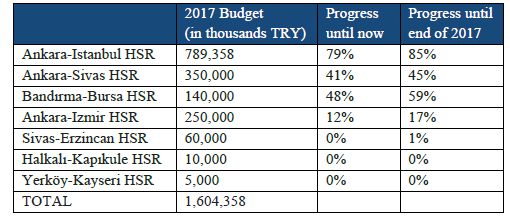Last week, Regulation on Railway Coordination Board ("Regulation") has been published in the Official Gazette dated 2 June 2017 and numbered 30084. The Board is charged with developing railway improvement policies and preparing studies in relation to investment needs of the railway sector. The Coordination Board, after the separation of railway infrastructure operation and transportation activities, will ensure coordination and harmony between railway infrastructure operators, railway train operators and other railway operators and the General Directorate of Railway Regulation.
The Regulation also details the authorities and functioning of the Coordination Board. Accordingly, pursuant to Article 4 of the Regulation, the Board will meet in the presidency of the Deputy Undersecretary responsible for railways and be composed of General Director of Railway Regulation, Director General of Infrastructure Investments, Director General of Dangerous Goods and Combined Transportation, General Director of TCDD and General Manager of TCDD Taşımacılık A.Ş.
Attracting Private Investment Is A Must For Meeting 2023 Development Goals in Railway Sector
Modernization and liberalization of the railway transportation in Turkey has long been on top of Turkish government's economic agenda. Turkish government, given the importance attached to improvement of national transport infrastructure, has invested TRY 41.9 billion (approximately USD 12 billion) in railways between 2003-2014. As part of its 2023 goals, the government has an ambitious plan to develop high-speed railway ("HSR") network connecting 14 cities and modernize its railways, trains and stations.

However, the table prepared based on the figures in Turkey's 2017 central budget1 shows that the resources allocated to seven railway projects are not even close to make significant progress for reaching its 2023 goals of high-speed railway development and modernization. Consequently, Turkey has no other way but to encourage private investment in railway infrastructure and transport either by way of privatization or by adopting public-private partnership ("PPP") model. The practitioners following Turkey know very well that the government has been highly successful in implementing both models.
Turkey, since its first privatization completed in 1986, has continuously privatized several state owned strategic assets and profitable economic enterprises one after another and also successfully implemented PPP model in the development of mega hospital and motorways projects over the last five years. As an example, out of 32 hospital PPP projects planned by the government, 17 of them that have been tendered managed to attract an investment amount around USD 10 billion.
Legal Infrastructure Already In Place For Investors To Step In
It is fortunate that Turkey has the necessary legal framework to replicate its success in the railway liberalization. First liberalization steps in Turkey were taken with the enactment of Statutory Decree on Administrative Structure and Duties of the Ministry of Transport, Maritime and Communication2 ("Ministry"). The Decree among others established the Directorate General of Railway Regulation ("Directorate") charged with improving railway transportation in Turkey and ensuring that railway transportation activities are conducted in a free, fair and sustainable competitive environment. The Directorate was also given special regulatory powers including authorization and supervision of "private" railway infrastructure operators and transportation companies. However, Provisional Article 8 of the Decree stated that provisions relating to the functioning of the Directorate would only take effect after the monopoly of Turkish state in the railway sector ended, which took nearly two years to happen.
As the second liberalization step, Turkish Parliament approved the Law Concerning Liberalization of Turkish Railway Transportation3 ("Law") in May 2013. The Law reads that Turkish State Railways ("TCDD") -the state institution previously acting as state monopoly-, will continue to be the railway infrastructure operator whereas the transportation activities i.e. the operation of trains / railway cars will be carried out by a joint stock company to be incorporated with the commercial title of TCDD Taşımacılık A.Ş. ("TCDD Transport"). Unfortunately, it took three years to implement this provision and TCDD Transport was finally incorporated in 17 June 2016 with the total capital of TRY 2.4 billion, wholly owned by TCDD itself i.e. the state railway infrastructure operator in its current structure.
The most important provision Article 6 of the Law grants authority to the Ministry to issue licenses for private companies and public legal entities in order for them to:
- construct new railway infrastructure network to be owned by themselves;
- operate railway infrastructure owned by themselves or by another enterprise; and
- operate railway transportation companies on the national network.
This provision provides the Ministry with a mandate to invite private companies to partake in the development of planned but not-yet started projects or in the completion and operation of the on-going projects (please check the table above). As far as we know, only two projects so far (i) a separate super high speed Ankara-Istanbul HSR project which is to reduce Ankara-Istanbul travel down to 1.5 hours and (ii) Ankara-Kapadokya HSR projects have been announced as may be completed by private companies under the Build-Operate-Transfer model. However, the High Planning Board of Turkey has approved none of these projects so far. Therefore, the legal infrastructure and the projects planned is there for the private investors to pick up and keep the investment going.
Newly Established TCDD Taşımacılık A.Ş. (TCDD Transport) Could And Should Be Privatized
In addition, TCDD Transport is categorized under Article 4 of the Law as a state economic enterprise subject to the provisions of Statutory Decree No: 2334. Pursuant to Article 1 of Law No: 4046 Concerning Arrangements for the Implementation of Privatization5 ("Privatization Law"), state economic enterprises and companies which are owned or controlled by the state or other public legal entities can be transferred to the privatization portfolio of the Privatization Administration, per Article 3 of the Privatization Law, upon the decision taken by the Privatization High Board. However, neither national railway infrastructure nor railway transportation company have been considered for privatization so far. Instead, the Privatization High Board with its Decision dated 30 December 2004 and numbered 2004/128 ordered to transfer the operation rights of six ports operated by TCDD i.e. Mersin, Izmir, Iskenderun, Samsun, Bandirma and Derince ports. Since then, the operation rights of Derince port for 39 years and Mersin, Iskenderun, Samsun and Bandirma ports for 36 years have been transferred to the private sector companies. Izmir port privatization halted several times and recently transferred to the portfolio of the new Turkish Wealth Fund.
Having regard to the Turkish government's commitment to and success in privatizing its strategically important assets such as the commercial ports, we see no reason on the side of the government why the transportation arm of the railway sector TCDD Transport should be kept state-owned and a potential competition between operators thus a rapid modernization in railway transportation should be prevented.
For the full text of amendments to the Regulation on Railway Coordination Board (only available in Turkish) please click here.
Footnotes
1. Central Administration Budget Law published in the Official Gazette dated and numbered. For the full text, please click here (available in Turkish)
2. Statutory Decree on Administrative Structure and Duties of the Ministry of Transport, Maritime and Communication published in the Official Gazette dated 1 November 2011 and numbered 28102
3. Law Concerning Liberalization of Turkish Railway Transportation published in the Official Gazette dated 1 May 2013 and numbered 28634
4. Statutory Decree Regarding State Economic Enterprises published in the Official Gazette dated 18 June 1984 and numbered 18435 (bis)
5. Law No: 4046 Concerning Arrangements for the Implementation of Privatization published in the Official Gazette dated 27 November 1994 and numbered 22124.
The content of this article is intended to provide a general guide to the subject matter. Specialist advice should be sought about your specific circumstances.


